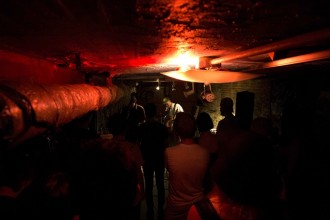Merriweather Post Pavilion is home for Baltimore experimental group Animal Collective, more significant than a simple performance venue. AC are famous for their frenetic and even cathartic live atmospheres, musicians thirsty to get on stage and leave their daily lives behind — from its name, then, we can glean that the album is about both a physical location and the sentiment it evokes. AC drummer and vocalist Panda Bear said after its release that MPP went about achieving its “live sound” in a completely different way than predecessor Strawberry Jam, recording each sample individually instead of tracking everything live (a technique most audible in the recording of album closer and old live song “Brother Sport”). In addition to being modelled sonically after its namesake (i.e. “sounding live,” being filled with the energy fans have come to expect from AC recordings and shows), MPP is an emotional evocation of the performing experience, an ode to musical escapism clocking in just under fifty-five minutes.
“If I could just leave my body for the night–” is probably one of the closest things to an artistic thesis I’ve ever heard in popular music, the undercurrent of what motivates so much of AC’s oeuvre. It marks a stark transition midway through opening track “In the Flowers” from lilting synth-folk to a swirling psychedelic contemplation on multiple fronts, the bleating synth overture to a reverb-soaked nostalgia chamber of an album. One of the most attractive aspects of MPP is its accessibility, referred to by many as AC’s most “poppy” album to date. The influence of the Beach Boys is indeed more audible than ever on many of these tracks (as close to “traditional love song” as AC will ever get, delivered in catchy and memorable vocal harmonies amidst waves of reverb), but AC never ceases to be an experimental group with an extensive array of nature samples, increasingly unusual vocal harmonies, and an ever-present bass thump reminiscent of late 00s hip-hop. In the end, accessibility and pop music are both about public appeal, and MPP succeeds in both evoking relatable sentiments and presenting its experimental soundscape in an accessible way.
The album talks about love as an intoxicating and necessary part of being, first demonstrated by Panda Bear’s family ties (insisting “I don’t mean to seem like I care about material things / I just want four walls and adobe slabs for my girls”) and later by Avey Tare’s romanticizing (“Let’s just stay in, there’s no one in our apartment babe”). Its lyrics are at once immensely personal and explicitly significant, synthesizing with the ease and flourish characteristic of Avey and Panda’s best work together. Interestingly, however, “Bluish” is no longer played live following Avey’s divorce with Kria Brekkan. Though performance seems to be a primary method for relieving their quotidien pains, here AC seems incapable of avoiding the clash of artistic and personal lives.
AC takes us through a panorama of poetry, scenes of intimacy, and existential frustration, but never lingers too long on the difficult questions before switching coyly into another melody or clap rhythm, reminding us quite literally that the show goes on regardless of vulnerable emotional content. The ending of the album, “Brother Sport,” continues this emotional wanderlust with Panda Bear’s attempt to alleviate his brother’s grief (“You gotta get rid of the mourning / Sort out the habits of your mind”), an ecstatic uprising that never ceases to make crowds go wild (the elation of the harmonized “MATT!!”). MPP as a live venue and as a recorded manifestation of that venue represents the escape from the “daily routine,” existential self-doubt, and pains of love (towards Avey’s ex-wife and Panda’s family) that seem so troubling without the help of music.
-Jonathan Ben-Menachem
Album available on Spotify and iTunes.





